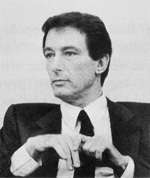Outrageous Betrayal: The Dark Journey of Werner Erhard from est to Exile
Steven Pressman
St. Martin’s Press: New York, 1993.
289 pp., $22.95 (cloth).
The general attitude of the media and most of the public to Werner Erhard, often described as “America’s most famous pop guru,” was crystallized in a review of this book in Erhard’s former hometown paper, The San Francisco Chronicle. The review concluded that “Outrageous Betrayal certainly succeeds as an indictment of Werner Erhard, who is portrayed here as a monster of selfishness. But the mystery of why so many people believed in the man and his message still remains to be solved.”

One of the reasons for the mystery is that nobody in the media bothers to speak to the people who value in his programs—the seminars of “personal growth” called “the est Training” or, more recently, “The Forum”—dismissing anyone a priori as conned or brainwashed who thinks the experience worthwhile. Yet more than a million people worldwide have done what Erhard calls “the work” (a term he borrowed from Gurdjieft), and according to a study by opinion analyst Daniel Yankelovich, seven out of ten participants in The Forum found it to be “one of their life’s most rewarding experiences,” while 94 percent felt the program had “practical” and “enduring” value.
They will hardly recognize freelance journalist Steven Pressman’s description of the est Training as “a mish-mash of self-help theories, common-sense psychology, and dime-store ideas of motivation.” If I was “conned” by that “mish-mash” when I did est in 1984, I’m grateful I was conned into losing the addiction to alcohol that had plagued me for a quarter of a century.
What is most baffling to me (and I am sure to other “graduates” of these programs) is not that Erhard’s “technology” is attacked by the media, but that the attacks describe it in a way that is roughly opposite to what I’ve experienced. A typical example is Pressman’s charge that “the work” caters to “individual needs, not the collective good of society,” a misconception he bolsters by adding:
“The problem is that these movements don’t teach you to weep for the world, only to weep for yourself,” a friend once remarked to the author Sam Keen.
I listen pretty attentively, but I’ve never heard any “message” in est or The Forum except that the only true satisfaction is in service to others.
How does one account for the many humanitarian projects begun by Erhard, his company, and countless graduates of his programs? The book dismisses such programs as “Youth at Risk,” for inner-city teen-agers, and “Prison Possibilities” for long-term inmates (“a captive audience,” Pressman jokes, sneering at the possibility of prisoners finding inner peace in their “unhappy life behind bars”) as a cynical ploy by Erhard:
From a fuzzy crusade against hunger to persistent efforts to reach the impressionable minds of young children, he waged a neverending campaign to carve out for himself an image of achievement and respectability.
Who’s the cynic, anyway? Not only est and Erhard are subjects of Pressman’s scorn. He sums up the attitude of the middle-class, establishment, journalistic culture that treats any efforts at transformation (if not AMA-approved) with snide condescension: the many Americans who were meditating by the seventies “were trying to find inner peace through hypnotic hums and soothing ommmmmms.” Just as Erhard gets his familiar discreditization by former occupation as a “car salesman,” so new “gurus” are similarly labeled and dismissed: “a former nightclub singer named Marianne Williamson,” and John Bradshaw, “a onetime drug company salesman.” So much for them.
The “exile” of the title refers to Erhard’s leaving the United States in 1991, on the heels of a 60 Minutes segment that tarred and feathered him with accusations from family and former associates of physical and sexual abuse, without testimony from defenders in his own family and among former employees. This was followed by inaccurate rumors in the press that he had fled the country to evade taxes. Erhard blames the Church of Scientology for “harassment” that drove him abroad, and the Los Angeles Times has reported that the church hired private investigators to dig up dirt on him. (L. Ron Hubbard believed that Erhard stole material from his own courses to use for est and took away potential customers.)
Werner Erhard is and will doubtless always be a controversial character whose confrontational style, taste for luxury living, and rumored outbursts of temper arouse anger in many. Like Gurdjieff, he has been called both “charlatan” and “genius”; what makes him a fascinating and influential figure is his complexity and contradictions. Ironically, he is usually painted as pure saint or monster, an attack in extremes that is bound to be as unconvincing as it is irrelevant. Pressman’s one-dimensional portrait proves the point.
Thank you for subscribing to Tricycle! As a nonprofit, we depend on readers like you to keep Buddhist teachings and practices widely available.